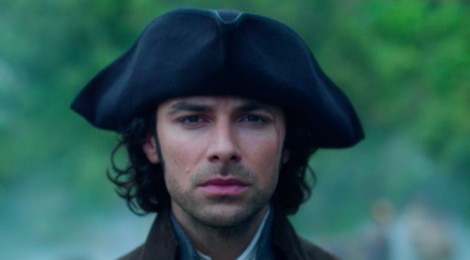
Review of NCLA Poldark Discussion
by Amber Tomlinson and Kayleigh Willox
On Friday 11th December in Culture Lab, the Newcastle Centre for the Literary Arts (NCLA) was host to former Newcastle alumni Debbie Horsfield and John Yorke, who were in conversation regarding Debbie’s recent adaptation of BBC TV drama Poldark.
With over 40 years’ experience of working for the BBC between them, we were eager to learn about the thoughts behind adapting one of 2015’s most popular TV series from novel to screen.
Although Poldark was Debbie’s first adaptation, she was very much in demand due to previous successful projects such as hairdressing drama Cutting It, which aired on BBC One between the years of 2002 and 2005. Throughout the hour long conversation, Debbie cited the problems she faced when editing the material for screen, these included budgeting costs which lead to the removal of some characters, having to describe certain contextual aspects to a contemporary audience, and specific scenes which had to be expanded visually due to the lack of detail in the book. For example, the scene where Demelza finds out about the death of baby Julia. In Winston Graham’s novel, the death is explained within one sentence, which allows for readers to use their imagination to gage how the characters are feeling. However Debbie said as a mother, she could not simply gloss over the loss of a child, and the performance by both Aidan Turner and Eleanor Tomlinson had to convey the characters’ grief and heartache to the audience.
Casting became the next topic of conversation, with many eager to learn how Debbie came to the conclusion of casting the very dishy Aidan Turner as protagonist Ross Poldark. She said that the character of Ross had to be charismatic, strong, vulnerable, arrogant and rebellious, and had Aidan in mind after seeing him in BBC dramas Desperate Romantics and Being Human. As Debbie claimed, ‘He was the right actor in the right role at the right part of his career’, which perhaps led to the huge affection and warmth towards Poldark.
The second scene played to the audience was a particularly infamous one of the series, and showcased the intimacy between Ross and Demelza. Debbie talked about how she changed the story here slightly, originally, Demelza put on the blue satin gown with the intent of seducing Ross, and after he refused her, she tried again. However in the TV series Demelza is caught in the dress by Ross, which leads to a kiss, she then visits his room, ‘unable’ to get the dress of, which leads to them sleeping together. Debbie talked about the rarity of eroticism in British TV, and how it is usually repressed, and that unlike Game of Thrones, Poldark does not only consist of nudity. She explained that she wanted to draw more upon the sensory elements within the scene, such as ‘the breath upon the neck and the rustling of the dress’.
The entire NCLA event was interesting from start to finish, listening to Debbie’s decisions behind the adaptation and the reasons why she chose to present the series in the traditional and epic style she did was absolutely fascinating. We even found out that the actor Robin Ellis, who played Ross Poldark in the original 1970’s series, took on a cameo role as Reverend Halse! In the words of John Yorke, ‘Poldark is where popular meets good’, and we will most definitely be tuning in for series two!
This review was previously published in The Courier, the Newcastle University student newspaper.
